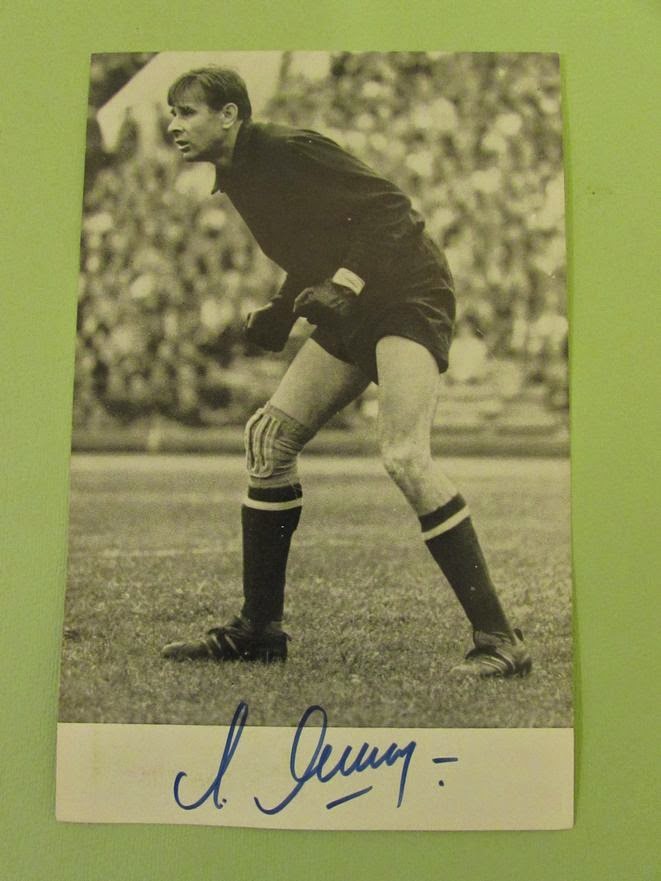 Lev Ivanovich Yashin
Lev Ivanovich Yashin (
Russian:
Лев Ива́нович Я́шин, 22 October 1929 – 20 March 1990), nicknamed as "The Black Spider" or "The Black Panther", was a
Soviet-
Russian football goalkeeper, considered by many to be the greatest goalkeeper in the history of the game. He was known for his athleticism in goal, imposing stature and reflex saves. He was also
deputy chairman of the
Football Federation of the Soviet Union.
Yashin earned iconic status for revolutionizing the goalkeeping position by stamping his authority on the entire defence.
He shouted orders at his defenders, came off his line to intercept
crosses and also ran out to meet onrushing attackers, done at a time
when goalkeepers spent the 90 minutes standing in the goal waiting to be
called into action.
His performances made an indelible impression on a global audience at the
1958 World Cup,
the first to be broadcast internationally, and dressed head to toe in
black his nickname the 'Black Spider' enhanced his popularity.
Yashin appeared in four
World Cups from 1958 to 1970, and in 2002 was chosen on the
FIFA Dream Team of the history of World Cups. In 1994 he was chosen for the
FIFA World Cup All-Time Team, and in 1998 was chosen a member of the
World Team of the 20th Century. He made over 150 penalty saves and kept over 270 clean sheets in his career, winning a Gold medal at the
1956 Olympic football tournament, and won the
1960 European Championships.
In 1963, Yashin was named the
European Footballer of the Year, the only goalkeeper ever to receive the award.
He was voted the best goalkeeper of the 20th century by the
IFFHS.

In 1954, Yashin was called up to the
national team, and would go on to gather 74
caps.
With the national team he won the
1956 Summer Olympics and the
1960 European Championship. He also played in three
World Cups, in
1958,
1962 and
1966. Yashin is credited with four
clean sheets out of the 12 games he played in the World Cup finals.
The 1958 World Cup, played in
Sweden,
put Yashin on the map for his performances, with the Soviet Union
advancing to the quarter-finals. In a group stage match against the
eventual Cup winners
Brazil, which the Soviet team lost 2–0, Yashin’s performance prevented the score from becoming a rout.
He was selected into the
All-Star Team that World Cup.
In 1962, despite suffering two concussions during the tournament, he
once again led the team to a quarter-final finish, before losing to host
country
Chile.
That tournament showed that Yashin was all too human, having made some uncharacteristic mistakes. In the game against
Colombia, which the Soviet Union was leading 4–1, Yashin let in a few soft goals, including a goal scored by
Marcos Coll directly from a
corner kick
(the first and the only goal scored directly from a corner in FIFA
World Cup history). The game finished in a 4–4 tie, which led the French
newspaper
l'Equipe to predict the end of Yashin’s career.

Despite the disappointment of the 1962 World Cup, Yashin would bounce back to win the
Ballon d'Or in 1963. One of his best performances that year was the
FA Centenary match, when he appeared in the ‘Rest of the World XI’ against
England at
Wembley Stadium,
and made a number of breathtaking and almost unbelievable saves. From
that point onward he was known all over the world as the "Black Spider"
because he wore a distinctive all-black outfit and because it seemed as
though he had eight arms to save almost everything.
But to his fans, he was always the fearless "Black Panther". He often
played wearing a cloth cap of burnt-brick colour. Yashin led the Soviet
team to its best showing at the FIFA World Cup, a fourth place finish in
the
1966 World Cup held in England.
Always ready to give advice to his comrades, Yashin even made a fourth trip to the World Cup finals in
1970,
held in Mexico, as the third-choice back-up and an assistant coach. The
Soviet team again reached the quarter-finals. In 1971, in Moscow, he
played his last match for Dynamo Moscow. Lev Yashin’s
FIFA testimonial match was held at the
Lenin Stadium in Moscow with 100,000 fans attending and a host of football stars, including
Pelé,
Eusébio and
Franz Beckenbauer.




